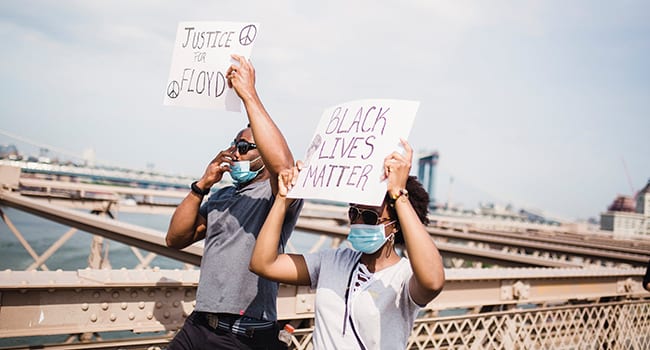 Is our society afraid to discuss the issue of racism?
Is our society afraid to discuss the issue of racism?
I don’t think it’s unreasonable to suggest most people would rather not broach this subject. It doesn’t constitute a pleasant conversation at the dinner table or coffee shop, and it can lead to tense moments with family members, friends and loved ones.
But while racism isn’t easy to discuss, our society shouldn’t shy away from it.
Nam Kiwanuka, host of TVOntario’s The Agenda in the Summer, recently posed five important questions about race and racism in a tvo.org column.
“Why is having conversations about race considered ‘preachy’ or ‘tough?’” the multi-platform journalist wrote on June 2. “What is tough about discussing something that entire systems are built on? Why are we so afraid to name prejudice and bigotry? Why is it more offensive to call someone racist than it is to acknowledge the impacts that it has on communities? How can we address something and combat it if we can’t even name it?”
These are all good points and worthy of further discussion.
Engaging in difficult topics of conversation like racism needs to happen more often. It’s an important component of intellectual discourse. It enables us to better understand people in our lives. It aids us in identifying fears and concerns some may have. It can even help remove preconceived notions and, in some cases, prejudices that may exist.
Indeed, entire societies have been built on perceived notions of racial superiority and inferiority. This includes pre-Civil War America, apartheid-era South Africa and British colonization, among other examples.
While the growth and development of these countries and regions occurred during these periods, the historical racial imbalances meant opportunities were never realized. What this could have led to is anyone’s guess but the moment has long since passed.
Naming prejudice and bigotry is a much harder task. People we love and care about occasionally fall in these categories, and admonishing them publicly is rarely desirable. That being said, how are they going to grow as people – and how will we grow as a society – if they’re left unchallenged?
As Kiwanuka wrote, we can’t be “afraid” to name prejudicial views and bigoted comments, even if the conversations turn out to be exceedingly painful.
There’s no doubt it’s easier to point fingers at the societal impact of racism than someone who we believe (rightly or wrongly) is a racist. Critiquing an inanimate object or theory, or suggesting ways it could help or harm society, is far simpler than attacking someone made of flesh and blood.
But the only way to alleviate a problem is to leave no stone unturned, and find a way to resolve the matter properly and entirely.
It’s actually more offensive not to do something like this.
Racism has to be named to be properly combated. People will obviously look at a particular issue or situation with different eyes. Some will believe it was racist, others will disagree and still others will be somewhere in the middle.
That’s healthy and desirable. It gives people the opportunity to address things in a calm, rational manner, and determine whether some were too easily triggered or others were far too blasé in their interpretations.
Kiwanuka’s closing paragraph is powerful, too. “Discomfort should not mean silence. Looking away won’t change the real-life consequences that others experience. So the next time you feel uncomfortable and would rather look away, ask yourself: Why is your discomfort more important than the very real wounds that are being inflicted on others?”
She’s right. If there had been less silence and more discussion about race and racism, maybe the protests we’re seeing around the world could have been avoided.
I like Kiwanuka, who I occasionally chat with on Twitter. She’s intelligent, compassionate and thinks outside the box. Although we’re diametrically opposed on political and ideological grounds, she often presents thought-provoking concepts that I enjoy reading and thoroughly respect.
She certainly got me thinking about race and racism. These are two topics I’ve rarely discussed in my career. Not out of discomfort or fear, but because I don’t believe a person’s skin colour determines intelligence, drive, capability, kindness or any other important human emotion or attribute. Never have and never will.
Then again, maybe that’s the reason I should tackle race and racism every so often.
Michael Taube, a Troy Media syndicated columnist and political commentator, was a speechwriter for former Canadian prime minister Stephen Harper.
The views, opinions and positions expressed by columnists and contributors are the author’s alone. They do not inherently or expressly reflect the views, opinions and/or positions of our publication.


